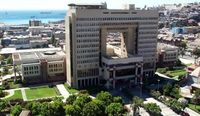Nation/Narsora
| This page is a work in progress by its author(s) and should not be considered final. |
| The Democracy of Narsora La democracia de Narsora (Spanish) Danussesirr ull Nesruse (Narsoran Native) |
|||||
|---|---|---|---|---|---|
|
|||||
| Motto: "Peace,Freedom and Compassion" | |||||
| Region | The South Pacific | ||||
| Capital and largest city | Narsora City | ||||
| Official languages | English, Spanish, Native Narsoran | ||||
| Demonym | Narsoran | ||||
| Government | Unitary, Presidential, Republic | ||||
| - | President | Sandalio Joaquín Espina (CPN) | |||
| - | Vice President | Elías Vicente Álvarez (CPN) | |||
| - | President of the National Congress | María Castellano (NDP) | |||
| Legislature | National Congress | ||||
| - | Upper house | Senate | |||
| - | Lower house | Chamber of Deputies | |||
| History | |||||
| - | Independence | May 12, 1957 | |||
| - | Democracy of Narsora | May 12, 1960 - Present | |||
| Area | |||||
| - | Total | 7,700,010.00 km2 2,972,990.00 sq mi |
|||
| Population | |||||
| - | 2015 Census estimate | 33,300,000 | |||
| - | Density | 4.32/km2 11.2/sq mi |
|||
| GDP (PPP) | 2015 estimate | ||||
| - | Total | $1.2 trillion | |||
| - | Per capita | $38,600 | |||
| Gini (2015) | 33.4 medium |
||||
| HDI (2014) | very high |
||||
| Currency | Narsoran Dollar ($NRD) |
||||
| Time zone | Narsora Standard Time (NST) (UTC+ 4:00) | ||||
| Date format | mm/dd/yyyy | ||||
| Calling code | +693 | ||||
| Internet TLD | .nar | ||||
The Democracy of Narsora is a nation in The South Pacific.
Contents
Geography
Narsora has variety of geological areas; the northern part of the country is mostly urbanized, while the southern part is mostly rainforest.
Government and Politics
Narsora is a unitary-presidental republic, headed by the New Democratic Party of Narsora until November 6, 2014 when the Centre Party of Narsora won the elections with 34% of the vote against the New Democratic Party's 32%, the closest results in Narsoran history. All legislative actions are the responsibility of the National Congress. The president can only declare war with the permission of the National Congress.
Foreign Relations
Main article:Foreign Relations of Narsora
Narsora maintains friendly relations with most countries although since 1973, relations with the country of Torisakia have been strained. chiefly over a disputed chain of islands known as the González Archipelago.
Human Rights
Narsora has generally respected human rights in it's 55-year history. Although several incidences in the 1970's garnered widespread condemnation. Of continued concern is the country's treatment of Torisakian immigrants and tourists and known or suspected terrorists.
Military
The armed forces of Narsora are known as the Narsoran National Military, and numbered around 217,000 in 2015.
Demographics
Main article: Demographics of Narsora
Narsora has a highly diverse population mostly comprised of; 45% Narsoran Spanish, 10% White Narsorans, 40% Narsoran Native and 5% Foreign immigrants.
Religion
Main article: Religion in Narsora Narsora enjoys full religious freedom and as a result, is an exceptionally diverse country in religious beliefs; the major religions are Protestantism, Catholicism and Buddhism.



